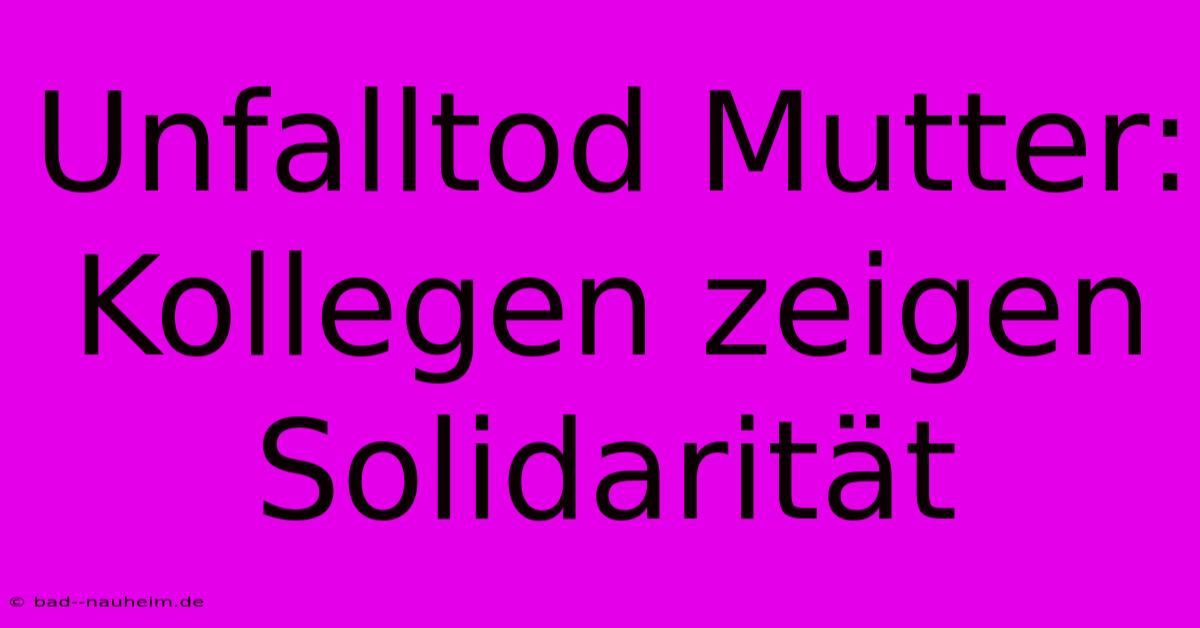Unfalltod Mutter: Kollegen Zeigen Solidarität

Discover more detailed and exciting information on our website. Click the link below to start your adventure: Visit Best Website Unfalltod Mutter: Kollegen Zeigen Solidarität. Don't miss out!
Table of Contents
Unfalltod Mutter: Kollegen zeigen Solidarität – Eine Geschichte von Verlust und Zusammenhalt
Man, this one hits close to home. Writing about the death of a colleague's mother, especially a sudden, tragic accident… it's tough. But it's also a story about the incredible power of human connection and workplace solidarity, something I think is really important to share. It happened a few years ago, and I still remember it vividly.
The Shock and the Silence
Our team, a close-knit group working on a major software project, was hit hard. One Monday morning, our team lead, Anna, came in looking… pale. She mumbled something about a family emergency. Then, the email came. A short, stark message detailing the tragic car accident that took her mother's life. The silence that followed was deafening. It wasn't the polite, hushed silence of a respectful workplace; it was the stunned, gut-wrenching silence of shared grief. It was surreal. Like someone had punched the air out of the room.
Showing Up – More Than Just Words
What happened next though? That was something else entirely. It wasn't just words of sympathy, although those were plentiful. People brought food – mountains of it. Lasagna, casseroles, enough sandwiches to feed a small army. There were also practical offers of help: childcare for Anna's kids, assistance with arrangements, even someone volunteered to walk her dog. You know, the little things that make a huge difference during a time of intense grief. It wasn't about grand gestures. It was about showing up, being present, and bearing the weight of collective sorrow.
The Power of Collective Grief
I’ve seen a lot in my years working in different teams and companies. But witnessing this level of empathy and support, well, it was profound. It taught me a valuable lesson: true workplace solidarity goes beyond casual conversation and team-building exercises. It's about genuine human connection and acting when it truly matters. Dealing with the death of a loved one is already incredibly tough; the added burden of work responsibilities can be crippling. It’s important to understand the significance of providing support – emotional, practical, whatever is needed. This is particularly important in a high-pressure environment.
This situation brought the importance of emotional intelligence (EQ) into sharp focus. We didn't just offer condolences, we listened. We recognized that everyone grieves differently, and respected that. Some people needed space, others craved company. We adapted, learning to respond effectively to everyone's specific needs.
Practical Tips for Showing Support
If you ever find yourself in a similar situation, here's what I learned:
- Don't underestimate the power of a simple "I'm here for you." Sometimes, that's all someone needs to hear.
- Offer concrete help. Don’t just ask, "What can I do?". Offer specific help; "Can I cover your shift next week?", "I can pick up your kids from school."
- Respect their space. Some people need time alone to grieve; don’t push it.
- Consider a team-wide memorial. A small gesture can go a long way in showing collective support.
And finally, remember that processing grief takes time. It's not a race, nor is there a right or wrong way. Be patient, be understanding, and most importantly, be human.
Anna eventually returned to work, and our team, stronger than ever, continued working on the project. And for me? It reminded me that work isn't just about deadlines and deliverables; it's about people. And sometimes, showing solidarity is the most important thing we can do. It's a lesson I'll never forget.

Thank you for visiting our website wich cover about Unfalltod Mutter: Kollegen Zeigen Solidarität. We hope the information provided has been useful to you. Feel free to contact us if you have any questions or need further assistance. See you next time and dont miss to bookmark.
Featured Posts
-
Bremen Verloren Der Beste Spieler Siegt
Nov 24, 2024
-
Eiskunstlauf Deutsches Duo Erfolgreich In China
Nov 24, 2024
-
Wintertransfer Grillitsch Geht
Nov 24, 2024
-
Deutsches Eiskunstlauf Duo Gewinnt Medaille In China
Nov 24, 2024
-
Mbappes Durststrecke Real Madrid
Nov 24, 2024
